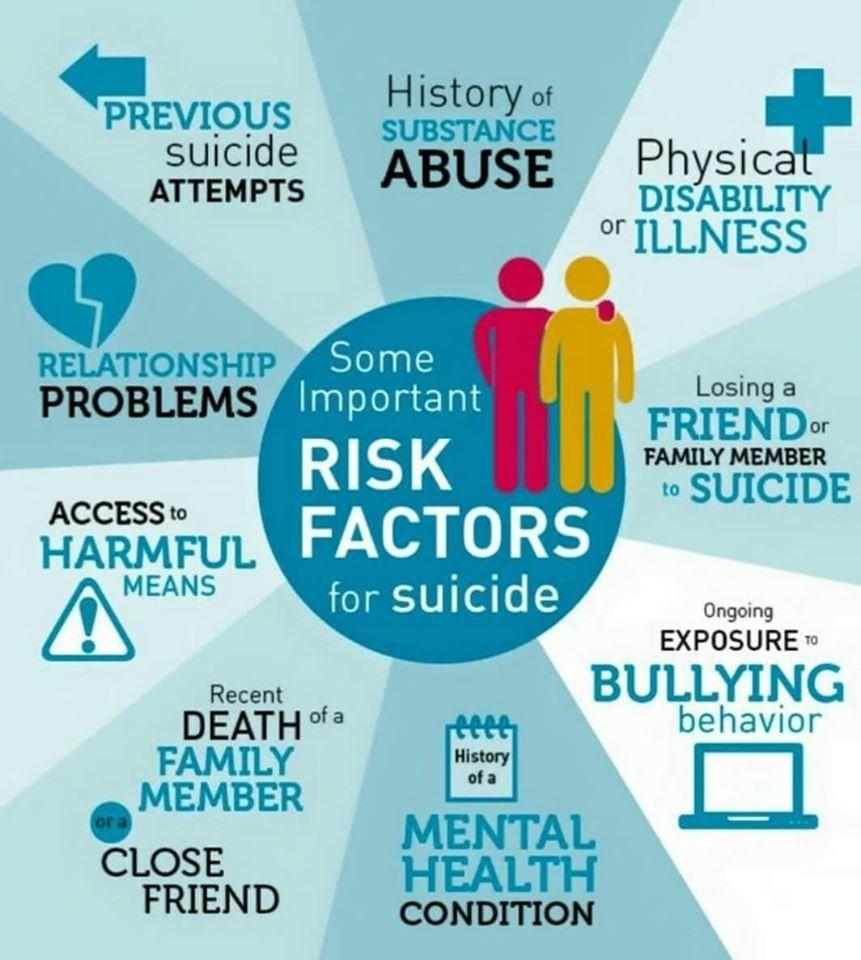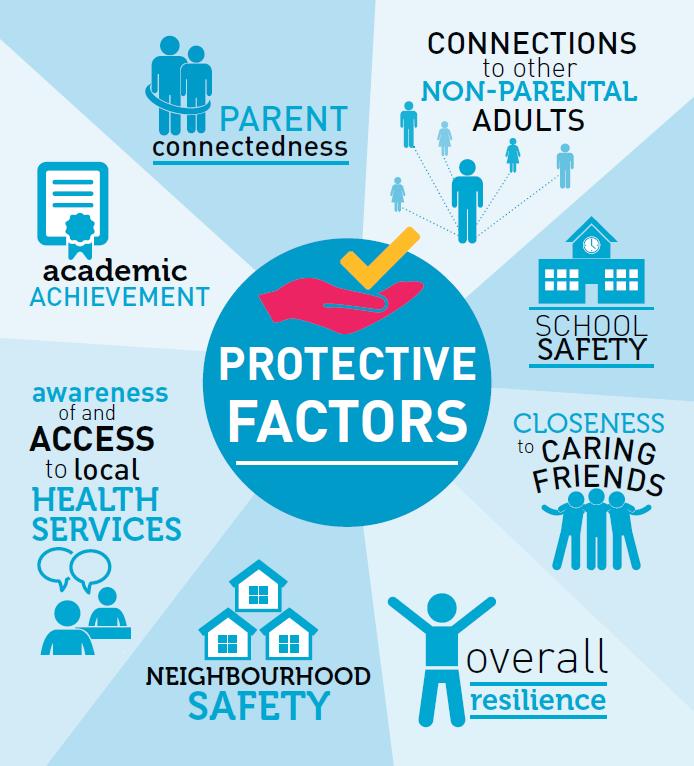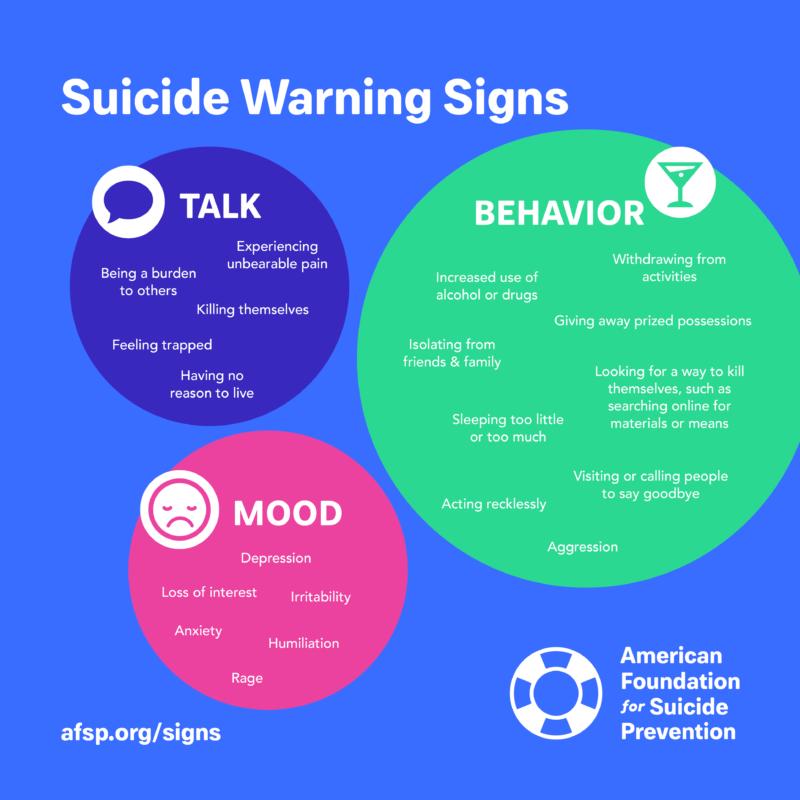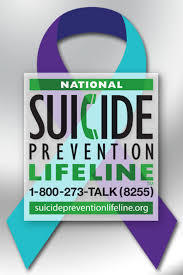
If you or someone you know is at risk of harming themselves or others, please call 911 immediately.
If you are having a non-emergency crisis and are in need of support, please reach out to the resources listed below, including:
National Suicide Prevention Hotline: 1-800-SUICIDE (784-2433) or 1-800-442-HOPE (4673) or 1-800-273-TALK (8255) or text "TALK" to 741741 Toll-free, 24-hour, confidential hotlines which connect you to a trained counselor at the nearest suicide crisis center.
National Alliance on Mental Illness (NAMI): Text “HELPLINE” to 62640 between 10 a.m.–10 p.m. ET, Monday–Friday, to connect with the NAMI HelpLine. NAMI HelpLine is also available Monday–Friday, 10 a.m.–10 p.m. ET by phone at 1-800-950-NAMI (6264), via the “Chat with us” web widget, or by email at helpline@nami.org.
.png)

The following information regarding suicide is from the The National Institute of Mental Health:
Suicide is a major public health problem and a leading cause of death in the United States. The effects of suicide go beyond the person who acts to take his or her life: it can have a lasting effect on family, friends, and communities.
What Is Suicide?
Suicide is when people direct violence at themselves with the intent to end their lives, and they die because of their actions. It’s best to avoid the use of terms like “committing suicide” or a “successful suicide” when referring to a death by suicide as these terms often carry negative connotations.
A suicide attempt is when people harm themselves with the intent to end their lives, but they do not die because of their actions.
Who Is at Risk for Suicide?
 Suicide does not discriminate. People of all genders, ages, and ethnicities can be at risk.
Suicide does not discriminate. People of all genders, ages, and ethnicities can be at risk.
The main risk factors for suicide are:
- A prior suicide attempt
- Depression and other mental health disorders
- Substance abuse disorder
- Family history of a mental health or substance abuse disorder
- Family history of suicide
- Family violence, including physical or sexual abuse
- Having guns in the home
- Being in prison or jail
- Being exposed to others' suicidal behavior, such as a family member, peer or media figure
- Medical illness
- Being between the ages of 15 and 24 years or over age 60
Even among people who have risk factors for suicide, most do not attempt suicide. It remains difficult to predict who will act on suicidal thoughts.
 Are there protective factors for suicide?
Are there protective factors for suicide?
The following are thought to be protective factors:
- Connections to parents and other trusted adults
- School environment where the person feels safe and successful
- Neighborhood environment where the person feels safe
- Having close relationships with caring friends
- Resilience
- Awareness of and access to local resources including health services
What Are the Warning Signs of Suicide?
 The behaviors listed below may be signs that someone is thinking about suicide.
The behaviors listed below may be signs that someone is thinking about suicide.
- Talking about wanting to die or wanting to kill themselves
- Talking about feeling empty, hopeless, or having no reason to live
- Planning or looking for a way to kill themselves, such as searching online, stockpiling pills, or newly acquiring potentially lethal items (e.g., firearms, ropes)
- Talking about great guilt or shame
- Talking about feeling trapped or feeling that there are no solutions
- Feeling unbearable pain, both physical or emotional
- Talking about being a burden to others
- Using alcohol or drugs more often
- Acting anxious or agitated
- Withdrawing from family and friends
- Changing eating or sleeping habits
- Showing rage or talking about seeking revenge
- Taking risks that could lead to death, such as reckless driving
- Talking or thinking about death often
- Displaying extreme mood swings, suddenly changing from very sad to very calm or happy
- Giving away important possessions
- Saying goodbye to friends or family
- Putting affairs in order, making a will
If You Ask Someone About Suicide, Does It Put the Idea Into Their Head?
Asking someone about suicide is not harmful. There is a common myth that asking someone about suicide can put the idea into their head. This is not true. Several studies examining this concern have demonstrated that asking people about suicidal thoughts and behavior does not induce or increase such thoughts and experiences. In fact, asking someone directly, “Are you thinking of killing yourself,” can be the best way to identify someone at risk for suicide.
What Should I Do if I Am in Crisis or Someone I Know Is Considering Suicide?
If you or someone you know has warning signs or symptoms of suicide, particularly if there is a change in the behavior or a new behavior, get help as soon as possible.
Often, family and friends are the first to recognize the warning signs of suicide and can take the first step toward helping an at-risk individual find treatment with someone who specializes in diagnosing and treating mental health conditions. If someone is telling you that they are going to kill themselves, do not leave them alone. Do not promise anyone that you will keep their suicidal thoughts a secret. Make sure to tell a trusted friend or family member, or if you are a student, an adult with whom you feel comfortable. You can also contact the resources noted below.
.png)
If you or someone you know is at risk of harming themselves or others, please tell a trusted adult or call 911 immediately, describe the situation and ask for help. If you are having a non-emergency crisis, there are many resources available. Below is a list of resources to know about in case you find yourself or someone you know needing support.
Support at School
There are many people at school who are willing to listen and talk. Please reach out to a trusted adult at school if you need help. A list of school support resources can be found here. Information shared with school counselors and nurses will not be shared without your permission, unless there is a risk of harm to yourself or someone else.
Hotlines — Call & Text Support
National Suicide Prevention Hotline: 1-800-SUICIDE (784-2433) or 1-800-442-HOPE (4673) or 1-800-273-TALK (8255) or text "TALK" to 741741
Toll-free, 24-hour, confidential hotlines which connect you to a trained counselor at the nearest suicide crisis center.
SAMHSA’s National Helpline: 1-800-662-HELP (4357)
A free, confidential, 24/7, 365-day-a-year treatment referral and information service (in English and Spanish) for individuals and families facing mental and/or substance use disorders.
Suicide Prevention Lifeline: 1-800-273-8255
This hotline connects callers to trained crisis counselors. Their website is a 24-hour confidential hotline that offers details on how to call if you need help and how to identify suicide warning signs.
NAMI Hotline: 1-800-950-NAMI (6264) or text “HELPLINE” to 62640
NAMI, the National Alliance on Mental Illness, is the nation’s largest grassroots mental health organization dedicated to building better lives for the millions of Americans affected by mental illness.
The Trevor Project: 1-866-488-7386 or text "START" to 678678
The Trevor Project is the leading national organization providing crisis intervention and suicide prevention services to lesbian, gay, bisexual, transgender, queer & questioning (LGBTQ) young people under 25.
JED Foundation: 1-800-273-TALK (8255) or text "START" to 741-741
The Jed Foundation (JED) empowers teens and young adults with the skills and support to grow into healthy, thriving adults.
Websites — Resources & Information
There are many resources about depression and finding help on the internet. Below are some dependable links that you can browse for information and support.
Active Minds
Active Minds is dedicated to saving lives and to building stronger families and communities. Through education, research, advocacy, and a focus on students and young adults ages 14-25, Active Minds is opening up the conversation about mental health and creating lasting change in the way mental health is talked about, cared for and valued in the United States.
Teen Mental Health
Teen Mental Health has the vision to help improve the mental health of youth by the effective translation and transfer of scientific knowledge.
HEARD Alliance
The HEARD Alliance (Health Care Alliance for Response to Adolescent Depression) provides resources for treating anxiety, depression, and related conditions, and preventing suicide in adolescents and young adults.
The Trevor Project
The Trevor Project is the leading national organization providing crisis intervention and suicide prevention services to lesbian, gay, bisexual, transgender, queer & questioning (LGBTQ) young people under 25.
JED Foundation
The Jed Foundation (JED) empowers teens and young adults with the skills and support to grow into healthy, thriving adults.
American Foundation for Suicide Prevention (AFSP)
The American Foundation for Suicide Prevention is a voluntary health organization that gives those affected by suicide a nationwide community empowered by research, education and advocacy to take action against this leading cause of death.
Anxiety and Depression Association of America (ADAA)
The Anxiety and Depression Association of America (ADAA) is an international nonprofit organization dedicated to the prevention, treatment, and cure of anxiety, depression, OCD, PTSD, and co-occurring disorders through education, practice, and research.
NAMI - National Alliance on Mental Illness
NAMI's mission is to be dedicated to building better lives for the millions of Americans affected by mental illness.
NIMH - National Institute of Mental Health
The National Institute of Mental Health (NIMH) is the lead federal agency for research on mental disorders.
Apps
There are certain apps designed to help you relax, sleep better, and track your emotions. Here are some that might be relevant to what you're looking for.
Calm
Learn the life-changing skill of meditation; get more restful sleep and wake up feeling refreshed; video lessons on mindful movement and gentle stretching; exclusive music to help you focus, relax, and sleep.
Headspace
Live a healthier, happier, more well-rested life with Headspace.
Insight Timer
The largest free library of guided meditations on earth with more than 27000 titles.
Sanvello
Sanvello offers clinically validated techniques and support to help you relieve symptoms and feel happier over time.
Smiling Mind
A daily mindfulness and meditation guide at your fingertips, equipping young people with the integral skills they need to thrive in life.
While we strive to make the information on these pages as timely and accurate as possible, we cannot guarantee this at all times. Any reference to any person, organization, activities, or products, or any links from this website to the website of another party, do not constitute or imply the endorsement, recommendation, or favoring of Shrewsbury Public Schools.
-
About Us
- Mission & Core Values
- Portrait of a Graduate
- 2023-2027 Strategic Plan
- 2025-2026 Strategic Goals & Action Steps
- Long-Term Financial Planning for Shrewsbury Public Schools
- Student Opportunity Act (SOA) Plan
- Sleep Health Advisory Committee/School Start Times
- School Department Report - 2022 Shrewsbury Annual Town Report
- 2018 & 2019 Annual Report
- Feedback From Stakeholders
- State of the District
- Student Enrollment & Staffing Levels
- Activities
- Administration
- Budget
- Bullying Prevention & Intervention
- Calendars
-
Communications
- Respiratory Virus Guidelines
- Equity Information
- Community Bulletin
- Shrewsbury School Journal
- Superintendent's Blog (opens in new window)
- Superintendent's Update
- Mailing Lists
- Social Media
- News
- Mandated Notifications
- Interpretation & Translation Services
- Translate a Document or Website Page
- 2018 & 2019 Annual Report
- 2017 Annual Report
- 2016 Annual Report (opens in new window)
- 2015 Annual Report (opens in new window)
- District Communications Survey Results Fall 2019 (opens in new window)
- District Communications Survey Slide Presentation December 2019 (opens in new window)
- Contact Us
- Directions
- Enrollment Data
- Equity
- Frequently Requested Forms & Applications
- Safety & Security
- Shrewsbury Education Association (opens in new window)
- School Wellness Advisory Committee (SWAC)
- Staff Resources
- Student Registration
- Superintendent
- Support Organizations
- Volunteer Opportunities
- Well-Being Guide
This site provides information using PDF, visit this link to download the Adobe Acrobat Reader DC software.

